-
Essential Tips for Library Visits with Toddlers
Going to the library is a great way to get your toddler excited about reading and to support the activities he or she is doing at his or her early childhood education center in Pembroke Pines . Library visits can be a fun and positive experience for your toddler and a good way to get him or her engaged in activities that don’t involve the television or your mobile device. Make the most of every library visit with this advice.

Set the Expectations
Before you go to the library, tell your toddler how you expect him or her to behave. Through being a student at an early learning center, your child will have practice following the rules and knowing when to be quiet and when to play, so put these skills to use in the library. Practice talking in a soft voice, and tell your child that he or she can only take one book off the shelf at a time. Remind your toddler to stay with you at all times. When you go into the library with these rules in place, you can focus on enjoying your visit instead of chasing your little one around.
Get Excited About Exploring
The library is full of wonders for your child, so let him or her have fun exploring every nook and cranny. As long as he or she sticks by you, let your child wander the aisles, look at the displays, and enjoy the toys and activities in the kids’ section. Don’t limit visits to just looking at books or just sticking to one section of the building. Getting your toddler excited about the library will get him or her excited about reading for life.Check Out Books
Your toddler will love the opportunity to pick out books to read together at home. Set a limit and help him or her browse, making selections together. Involve your child in the checkout process, and then use the opportunity to teach him or her about caring for books properly. Find a space at home that is just for library books, so they don’t get mixed with your own collection.
-
Raising Empathetic Children
In addition to the academic aspects, one of the biggest benefits of early childhood education is that it gives your child the opportunity to learn and practice social skills. When your toddler is in daycare or an early learning center in Pembroke Pines , he or she will learn skills, like empathy, in interactions with other students.
Watch this video to learn more about what you can do to raise your child to be empathetic to others. Although researchers believe that some level of emotional intelligence, like empathy, is genetic, there are many ways you can foster it and teach it in your child. Talk about interactions your toddler has at his or her early learning center in which your child noticed how another child was feeling. Talk about feelings characters in books or on TV shows are having. Above all, model empathetic behavior, so that your child follows your example.
-
The Importance of Hands-On Puzzles for Your Child’s Development
Few things are as important in early education and child development as hands-on activities. Puzzles are often used in early education classrooms as a tool to help children learn. You can bolster your child’s success in early education in Pembroke Pines by keeping hands-on puzzles available at home as well.
Hands-on puzzles provide three learning experiences for early education students. First, they get the opportunity to work on fine motor physical skills by holding the pieces and working them into different positions until they fit. Students get to practice cognitive skills as they attempt to solve the problem presented by the puzzle. Young learners also build emotional skills by working on puzzles, as they must practice patience and perseverance as they work to solve the puzzle and then are rewarded with the satisfaction of finishing the puzzle. When children solve puzzles together, they also get to practice social skills and learn to compromise and work collaboratively. Provide a variety of different puzzle types to boost your child’s learning experience.
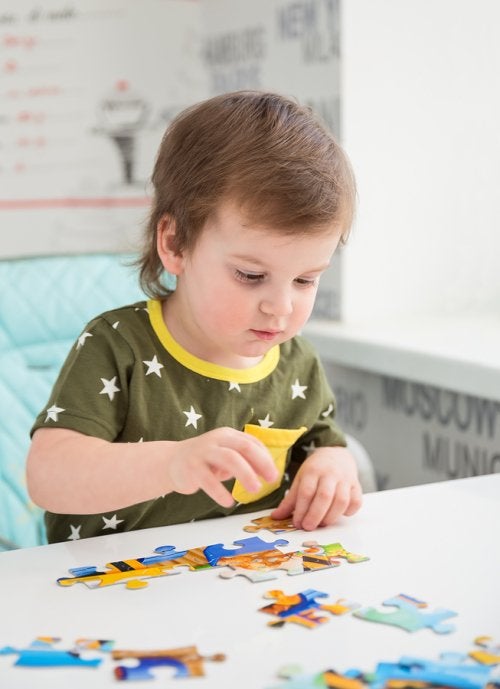
-
Does Your Child Get Too Much Screen Time?
One issue that today’s parents have to face much more than in the past is the question of screen time. Experts believe that spending too much time in front of a screen can damage early childhood development and make learning more difficult. Here is what you need to know about screen time and your child’s education and how limiting screen time can protect your child’s development in Pembroke Pines.
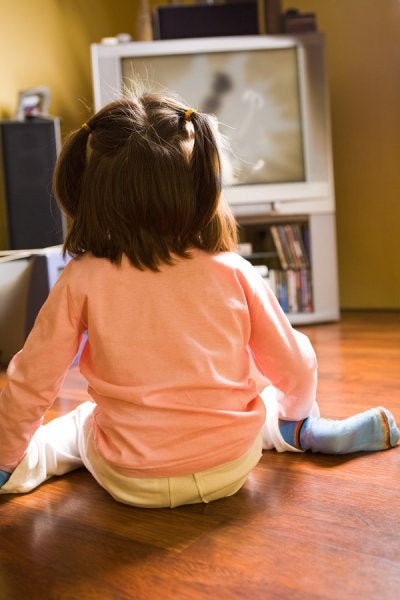
Defining Screen Time
In a world where we are constantly surrounded by digital technology, defining “screen time” is more difficult than ever. Furthermore, children are often expected to use computers in school and for homework. The experts of the American Academy of Pediatrics defines screen time as time spent using a digital device for entertainment purposes, so using a computer or other device for an academic exercise doesn’t count. However, it is more important to be in tune to how your child responds to being in front of a screen than to rate what activities count as entertainment and which do not.
Age-Related Recommendations
The American Academy of Pediatrics says that children should not have any screen time between birth and 18 months, as it can cause overstimulation, distress, and a disconnect between children and parents. Children aged two to five can have one hour of screen time per day. For children and teens six and older, screen time should be determined by parents based on the child’s overall behavior and the amount of time he or she has left in the day after all other needs and responsibilities are met.
Choosing the Right Screen Time
Some screen time can actually aid in child development. For instance, interactive tools such as Skype can be helpful for young children as they help them practice language and other skills. In other cases, apps can help children practice numbers, shapes, sounds, and letters. For healthy child development, limit the amount of screen time that is spent passively watching a show or movie—and that includes commercials that can over-stimulate a young child.
-
Why Should Your Child Go to Preschool?
It can be difficult for parents to be parted from their young children for part of the day, but preschool is your child’s path toward kindergarten readiness. Most children are ready for preschool in Pembroke Pines by about the age of three. Although your child is still quite small, he or she has already been absorbing a wealth of knowledge from everyday experiences. Enrolling your child in a high-quality early childhood education program enables him or her to learn critical skills for future success.
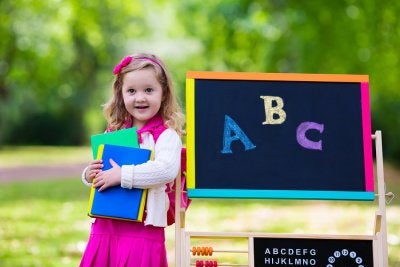
To Adjust to the Classroom Setting
Although there are always exceptions, teachers generally find that children who attended preschool are better prepared for kindergarten. One of the reasons for this is the child’s adjustment to the structured setting of school. When your child attends preschool, he or she is already getting accustomed to the routines of getting ready for school, participating in the classroom, and going home at the end of the school day. Preschoolers learn to follow the directions of the teacher, to appropriately gain the attention of the teacher when they need help, and to work on group and individual projects. Time for free play is indeed important, but children do need structure to thrive.
To Learn Appropriate Social Interactions
The social interactions that take place in the preschool classroom are invaluable. Without being under the watchful eye of their parents, kids need to learn how to cooperate with their peers . Your preschool student will acquire important skills like sharing, taking turns, respecting others, and developing empathy. Preschool classrooms also provide countless opportunities for children to learn about initiating and maintaining conversations.
To Develop Pre-Academic Skills
The typical preschool classroom features engaging, hands-on activities that guide children in learning pre-academic skills. While it might look like simple play to an observer, preschool activities set the stage for a child’s acquisition of language, science, and math skills.
To Work Toward Greater Independence
Your child still has plenty of growing to do and he or she will still be reliant on you for a long time to come. But the preschool age is typically the time when children express an increasing need for independence. Preschoolers need to start doing certain things for themselves and the classroom is the perfect setting for this sort of experimentation.
-
Helping Your Young Student with Reading
A child’s reading skills are one of the most influential predictors of future success. It’s never too soon to begin instilling early literacy skills in your young learner. In fact, simply talking to an infant often throughout the day will help him or her absorb the sounds and rhythms of language. As your young student enters first grade in Pembroke Pines, he or she will begin the transition from picture books to “easy readers.” There are many ways you can support your first grader’s reading skills at home.
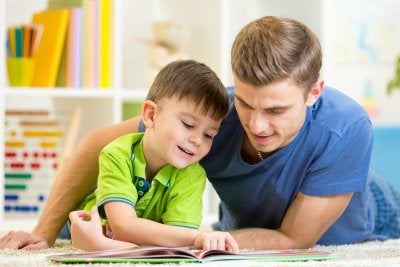
Create a Literate Home
First graders learn by example. To encourage your young learner to remain interested in books, it’s essential to be a good role model. Let your child see you reading a wide variety of materials every day, including fiction books, nonfiction books, magazines, and newspapers. Keep reading materials readily available in the home. Even if your child cannot read most titles yet, he or she will benefit from growing up in a literate home .
Build Phonemic Awareness
Phonemic awareness is an essential building block of literacy skills. This ability allows children to identify and use the individual sounds within the words. Better phonemic awareness supports a child’s reading comprehension and spelling abilities. You can support your child’s phonemic awareness by sounding out each individual component of the word when reading together. Even if a word has only one syllable, you can stretch out the sounds so that your child can hear them better. For example, the word “chair” can be broken down into the sounds “ch” and “air.”
Encourage Storytelling
If your child does not express much interest in books, you can engage him or her by encouraging your child’s natural storytelling abilities. Ask your child to tell you a story and write it down while he or she is speaking. Then, read the story aloud while pointing to each word. Do not expect a first grader to compose a long story complete with plot and themes. A simple story might consist of, “I like eggs. My cat is brown,” and so on. After writing down your child’s story, ask him or her to illustrate it to encourage a sense of ownership.
-
Kids and Reading for Pleasure
As your child reaches first grade , he or she will gradually read with greater fluency. During this sensitive age, it’s important that first graders in Pembroke Pines be encouraged to choose their own reading materials outside of class. Take your first grader to the library on a routine basis and let him or her choose books that appeal to him or her. The freedom of choice enables your child to develop a love of reading and it allows you to get to know your child’s interests better.
Watch this video to hear a child development expert discuss literacy in the early years. He explains that first graders are more likely to be receptive to their parents’ recommendations for first grade reading materials when the parents respect the children’s primary reading choices.
-
The Benefits of Pre-Kindergarten
When your child is about four years old, it’s time to enroll him or her in a pre-kindergarten program in Pembroke Pines . Pre-kindergarten introduces children to structured learning activities within a classroom environment. Not only do they learn essential pre-academic skills, pre-k students also grow in emotional and social maturity. If your child has already been attending preschool, then the transition to pre-kindergarten will be a natural and easy one to make.
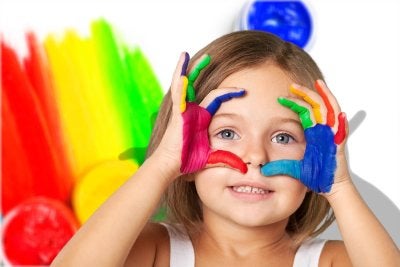
Independence
For parents of four-year-olds, it’s often difficult to accept that their little ones are developing their own independent identities. In fact, many parents often have a harder time adjusting to separation than their children do. Spending time in a school environment is an important step in every child’s development. Pre-kindergarten allows children to learn how to make their own choices (within reason) and thrive while away from home for a little while.
Socio-Emotional Maturity
Enrolling your child in a pre-kindergarten program will allow his or her socio-emotional intelligence to grow by leaps and bounds. All children need the life experiences that come from functioning as part of a small community. Through trial and error, and gentle guidance from the teacher, your child will learn how to interact with others in appropriate ways and how to enjoy group work as well as independent work. Your child will develop critical friendship skills like taking turns and sharing, and important classroom skills like how to capture the teacher’s attention appropriately. Being a member of a classroom community enables your child to practice his or her verbal communication skills with peers and adults.
Academic Foundation
Another primary benefit of enrolling your child in a pre-k school is to give him or her a solid foundation for lifelong learning. At this critical stage in a child’s development, he or she truly wants to learn. Your child is curious about the world and how it works, and pre-k nurtures this curiosity to encourage your child to develop a lifelong love of learning. Of course, your child will also learn crucial pre-academic skills that will prepare him or her to excel in kindergarten, first grade, and beyond.
-
Activity Ideas for Parents of Toddlers
Play is an essential part of toddler education, both in school and at home. Your toddler’s daycare will keep him or her occupied with a variety of play activities that also boost learning throughout the day. For activities for toddlers that give them the same learning experiences at home, watch this video.
Play teaches toddlers everything from colors and shape to fine motor skills, so try a variety of activities to keep your little one entertained. Puzzles are great for child development because they help toddlers practice a number of skills. Building forts, finger painting, and playing with balls are also fun and educational ways to spend time with your toddler.
-
Common Learning Activities for Pre-K Students
Pre-kindergarten, or pre-K is an extremely valuable transition year between early education and kindergarten that helps children prepare for the demands of the kindergarten classroom. Pre-K programs are voluntary and help children develop a love of learning that can last them a lifetime. If you are thinking of enrolling your children in pre-kindergarten in Pembroke Pines , here is what you need to know about what happens in the classroom.
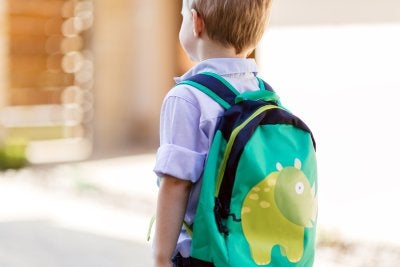
Self-Help Skills
When your child transitions to the big-kid world of kindergarten, he or she will be expected to be self-sufficient in a number of different ways. Although teachers will always be available to help, kids entering kindergarten benefit from knowing how to tie their shoes, zip and unzip their coats, and open the food in their lunchboxes. They should also know how to use their scissors, uncap their clue, and hold their pencils. Learning these self-help skills also gives kids a chance to practice their fine motor skills. These are also great things for parents to practice with their pre-kindergarten aged kids at him.
Letters and Numbers
Letter and numbers are a big part of kindergarten and pre-k. Kids in pre-Kindergarten will get plenty of practice recognizing and writing numbers and letters, which they will continue to learn and apply in kindergarten as they learn to read. Letters and numbers will be practiced in a number of different ways, especially through play.
Physical Play
Physical play has a long list of purposes in pre-k classroom. First, different types of physical play helps kids practice their gross and fine motor skills. Likewise, different play activities help kids learn other lessons, including counting, letters, and other pre-literacy and pre-math skills. Last but not least, physical play helps pre-k students work on their social skills. Through play, they have to learn to cooperate with classmates, respect and follow the rules, and compromise on disputes. Through play, they also get to practice winning and losing, which will help them throughout their school lives.
RECENT POSTS
categories
- Uncategorized
- Early Learning Center
- Pre-K
- Children
- Child Care Center
- Preschooler
- Preschool Blog Category | Tanglewood Academy
- Preschool Lunch
- Tanglewood Academy
- After-School Program
- Toddler School
- Early Childhood Education
- preschool activities
- pre-kindergarten
- childhood education
- pre-kindergarten programs
- Children’s education
- enrichment opportunities
- Kindergarten
- Nurturing Education Environment
- Toddler Care
- Child Separation Anxiety
- Toddlers
- Summer camp
- summer activities
- VPK
- Voluntary Pre-K
- Outdoor Activities
- Smart Strategies
- Tie Shoes
- Snacks
- Physical Activities
- Education
- Enrichment Activities for Kids
- Early Education Activities
- Preschool Curriculum
- Classroom Learning
- APPLE accreditation
- Language Comprehension
